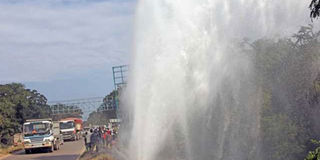Kenya loses Sh8 billion treated water every year

Water gushing out of a burst water pipe in Kibarani, Mombasa. Nearly half the water produced for drinking is lost to theft, illegal collections and poor governance.
PHOTO | FILE | NATION MEDIA GROUP
What you need to know:
- Key water sector stakeholders, among them officials from 67 water service providers, are attending the non-revenue water forum in Embu County.
- Water and Sanitation CS Simon Chelugui announced ambitious plans to reduce the loss of non-revenue water to at least 25 percent countrywide by 2030.
Kenya loses over Sh8 billion worth of treated water annually, meaning more than 45 per cent of the water produced for drinking is stolen, unbilled, or cannot be accounted for.
Water and Sanitation Cabinet Secretary Simon Chelugui said the loss of non-revenue water (water lost before it reaches the customer) is a major impediment to the realisation of the "Big Four" agenda, which he described as the cornerstone of Vision 2030.
In a speech read on his behalf by Water Chief Administrative Secretary Winnie Guchu, Mr Chelugui said the ministry is encouraging water service providers to come up with innovative ways of reducing water loss to improve access.
SERVICE PROVIDERS
Key water sector stakeholders, among them officials from 67 water service providers, are attending the non-revenue water forum in Embu County.
The CS said wasting water can cause conflicts, especially during dry periods.
“Issues pertaining to water have been a major cause of concern and discussion in the past few months. We have experienced severe drought and Kenyans understand and appreciate that water plays a key role in national stability, development and cohesion. It is, in fact, a cornerstone in the realisation of the "Big Four" agenda, which is a blueprint
MEGA DAMS
He announced ambitious plans to reduce the loss of non-revenue water to at least 25 percent countrywide by 2030.
The CS reiterated the government’s commitment to completing several mega dams in different parts of the country to boost access to water.
He appealed to county governments to minimise water wastage and to help promote competence in water management.
Embu Deputy Governor David Kariuki said water wastage had denied people in dry areas, like Mbeere, enough water and called for measures to reduce the loss.
Water Service Providers Association (WASPA) chairman Daniel Ng’ang’a urged water companies to ensure they use new technologies to reduce the loss of non-revenue water.
DONOR SUPPORT
The CS said the government, with donor support, had undertaken a non-revenue water audit of nine water service providers in the country and had learnt with shock just how much treated water was lost.
It ranged from 31 percent in Malindi to 85 percent in Nakuru Rural. This indicates that almost half of the water produced for drinking is lost to theft, illegal connections, poor governance and cannot be accounted for,” Mr Chelugui said.
MEGA DAMS
He announced ambitious plans to reduce the loss of non-revenue water to at least 25 percent countrywide by 2030.
The CS reiterated the government’s commitment to completing several mega dams in different parts of the country to boost access to water.
He appealed to county governments to minimise water wastage and to help promote competence in water management.
Embu Deputy Governor David Kariuki said water wastage had denied people in dry areas, like Mbeere, enough water and called for measures to reduce the loss.
Water Service Providers Association (WASPA) chairman Daniel Ng’ang’a urged water companies to ensure they use new technologies to reduce the loss of non-revenue water.




